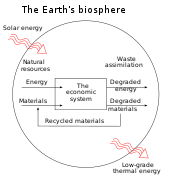
Back Daŭripova nekresko Esperanto رشد غیراقتصادی Persian Croissance non-économique French Crescimento deseconômico Portuguese Нерентабельный рост Russian
| Part of a series on |
| Ecological economics |
|---|
 |

Uneconomic growth is economic growth that reflects or creates a decline in the quality of life.[1] The concept is used in human development theory, welfare theory, and ecological economics. It is usually attributed to ecological economist Herman Daly, though other theorists may also be credited for the incipient idea,[2][3] According to Daly, "uneconomic growth occurs when increases in production come at an expense in resources and well-being that is worth more than the items made."[4] The cost, or decline in well-being, associated with extended economic growth is argued to arise as a result of "the social and environmental sacrifices made necessary by that growing encroachment on the eco-system."[5][6]
- ^ Orr, C.J. (2018). "Uneconomic Growth". Encyclopedia of the Anthropocene: 277–285. doi:10.1016/B978-0-12-809665-9.10474-4.
- ^ Daly, H. 2007. Ecological economics: the concept of scale and its relation to allocation, distribution, and uneconomic growth. pp. 82–103 in H. Daly. Ecological Economics and Sustainable Development: Selected Essays of Herman Daly. Cheltenham, UK: Edward Elgar.
- ^ Daly, H. 1999. Uneconomic growth and the built environment: in theory and in fact. In C.J. Kibert (ed.). Reshaping the Built Environment: Ecology, Ethics, and Economics. Washington DC: Island Press.
- ^ Daly, H. 2005. Economics in a full world. Scientific American 293(3): 100–107.
- ^ Daly, H. (26 April 1999). "Uneconomic growth in theory and in fact. The First Annual Feasta Lecture". Feasta Review. Trinity College, Dublin. Retrieved 7 December 2014.
- ^ Daly, H. and Farley, J. 2004. Ecological Economics: Principles and Applications. Washington: Island Press.
© MMXXIII Rich X Search. We shall prevail. All rights reserved. Rich X Search